|

ECHO
- EUROPEAN CIVIL PROTECTION & HUMANITARIAN AID OPERATIONS
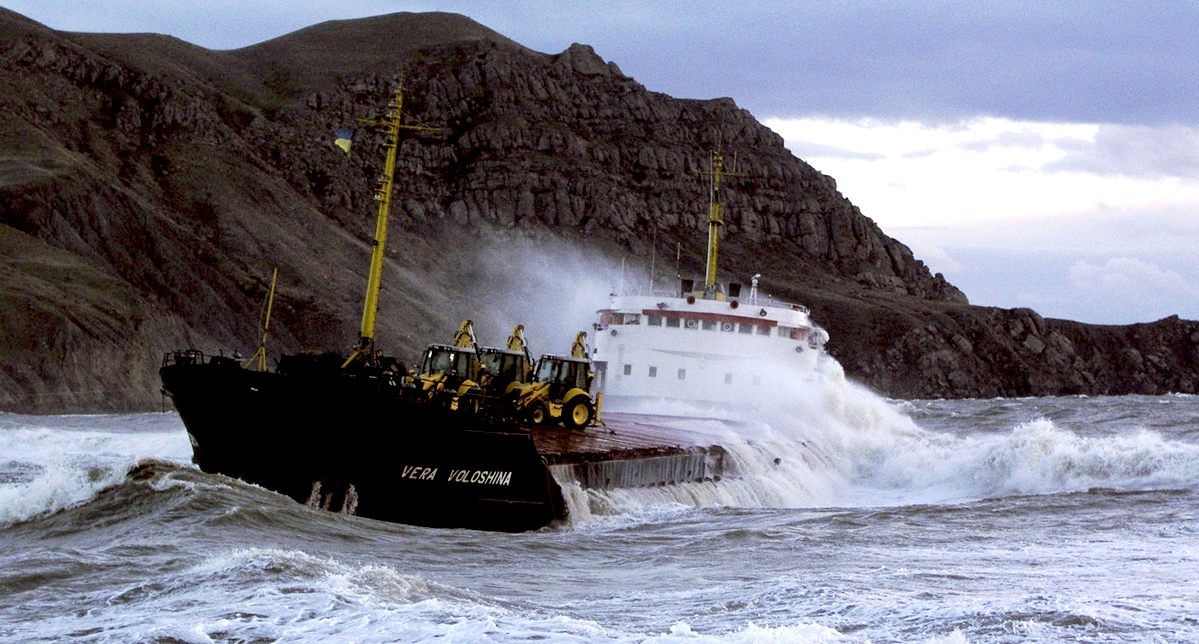
SHIPWRECKS -
The Russian-owned "Vera Voloshina" cargo ship is seen here after running aground during a heavy storm, near the Black Sea resort of Sudak, Ukraine, Sunday,
November 11 2007.
The Directorate-General for
European Civil Protection and Humanitarian Aid Operations
(ECHO) was formerly known as the European Community Humanitarian Aid
Office. This is the European Commission's department for overseas humanitarian aid and for civil protection.
In 2013 ECHO provided €1.35 billion for emergency relief. The European Union has been the second largest donor of humanitarian assistance since 2000. Together with its Member States, it is the world's biggest donor of humanitarian aid, providing over 50% of the total humanitarian aid in 2009. ECHO-funded projects affect over 120 million people in 90 countries annually.
For its humanitarian interventions, ECHO does not implement assistance programmes itself; but funds operations through a wide range of around 200 partners (NGOs, UN agencies, and international organisations such as the Red Cross/Red Crescent Movement). In 2013, ECHO had 44 field offices in 39 countries, with 149 international humanitarian experts and 315 national staff members. The field offices provide up-to-date analysis of existing and forecasted needs in a given country or region, contribute to the development of intervention strategies and policy development, provide technical support to ECHO funded operations, and ensure adequate monitoring of these interventions and facilitate donor's coordination at field level.
In addition to providing funding to humanitarian aid, ECHO is also in charge of the EU Civil Protection Mechanism. Established in 2001, the Mechanism fosters cooperation among national civil protection authorities across Europe. Currently 31 countries are members of the Mechanism; all 28 EU Member States in addition to Iceland, Norway, and the Republic of Macedonia. The Mechanism was set up to enable coordinated assistance from the participating states to victims of natural and man-made disasters in Europe and elsewhere.
After the EU was awarded the Nobel Peace Prize in 2012, the Barroso Commission accepted the prize money on behalf of the EU and allocated it to a new initiative called Children of Peace. Approximately €2 million was set aside for the Children of Peace projects in 2013. It was increased to €4 million in 2014.
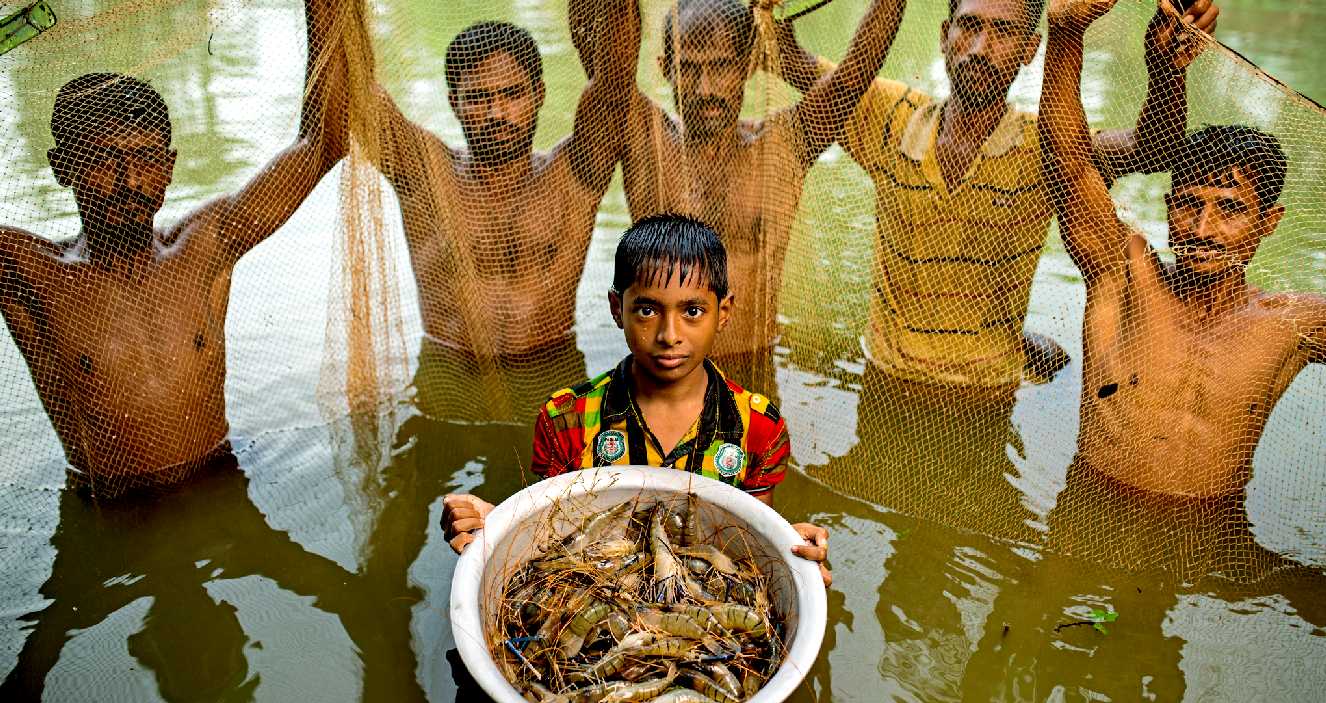
DWINDLING
FISH STOCKS - Food
security is a major problem the world will have to face as
the available land for to grow crops reduces in competition
with land for housing, as the population expands. The
situation is far from sustainable and a bubble that will
burst. When the bubble bursts it will cause the deaths of
millions of people, where additional farming will create more
carbon dioxide to heat the climate, making more land barren in
a vicious circle that we must take steps to prevent happening.
Around
10% of the world (700,000,000 million people) rely on the
ocean for food, but in addition to our poor land management
record, we are also polluting the seven seas with plastic that
is toxic - so reducing the number of fish that we might
harvest for food.
MARINE
POLLUTION
Why
is this important?
Accidental
oil spills and cleaning operations are the main source of
pollution from ships, placing enormous demands on the national
authorities responsible for response and clean-up operations. Europe
is the world's largest market of crude oil imports,
transported from and to Europe mainly by sea. Inevitably, some
of this makes its way into the sea, whether by accident or
resulting from ship operations. "Prestige"
and "Erika" are examples of the frightening
environmental damage that can be caused by accidents of large oil
spills.
How
are we helping?
Since
1978, the EU has played a vital role in the response to marine
pollution and today its role has become even greater with the
response coordination ensured by its Emergency
Response Coordination Centre and with marine
pollution preparedness and response services provided by
the European
Maritime Safety Agency (EMSA).
At
the end of the 70s, an action programme against hydrocarbons
pollution was set in motion and later extended to other
harmful substances. EU efforts were reinforced in 1984 by
setting up the "Urgent Pollution Alert Section" to
provide operational support to Member States. Preparedness and
response mechanisms in the field of marine pollution were
reinforced by the Community cooperation framework that ran
between 2000 and 2006.
EMSA
was established by the European Union in 2002 in the aftermath
of the Erika disaster. EMSA assumes the leading role in
ensuring a uniform and effective level of maritime safety,
maritime security, prevention of and response to pollution
caused by ships as well as response to marine
pollution caused by oil and gas installations and
providing technical and scientific assistance to the European
Commission and Member States.
EMSA
manages a network of standby at-sea oil
spill recovery vessels based in all the regional seas of
Europe. These are normal commercial vessels which carry out
day-to-day operations but, upon request, cease their normal
activities and quickly move to the scene of the oil spill. The
Agency also provides satellite imagery for detection and
monitoring of oil spills, pollution response experts to give
operational and technical assistance, and information service
for chemical spills at sea.
Often,
cleaning efforts and recovery from an oil spill require costs
which go beyond what a single country can bear. Therefore, a
number of regional and bilateral cooperation agreements were
established between maritime states. The EU participates in
these agreements and conventions that cover the regional seas
around Europe like the Helsinki
and Barcelona
conventions, and Lisbon and Bonn
Agreements.
The
EU Civil
Protection Mechanism also intervenes in marine pollution
emergencies. When a request for assistance is received
following a marine pollution incident, the Emergency
Response Coordination Centre can quickly mobilise oil
recovery capacity and expertise from the participating states
and EMSA,
and facilitate the deployment of these assets and the EU
Mechanism team.
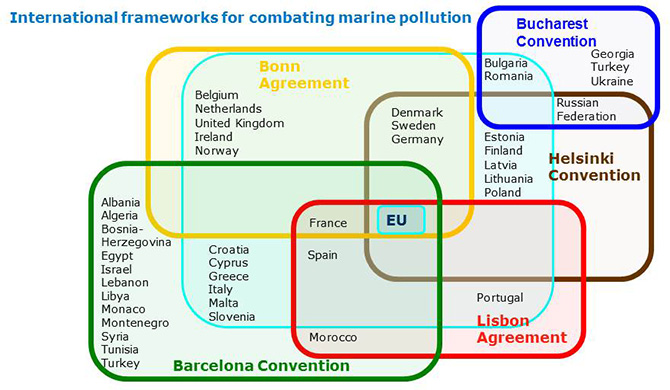
CALL
FOR PROPOSALS 2016
Call for proposals 2016 for prevention and preparedness projects in the field of civil protection and marine pollution
The objective of the Call is to select projects which support and complement the efforts of participating states and eligible third countries in prevention and preparedness in civil protection and marine pollution focusing on areas where a common European approach is more appropriate.
The legal framework for this Call is the Decision No 1313/2013/EU of the European Parliament and of the Council of 17 December 2013 on a Union Civil Protection Mechanism and its implementing rules (C(2014)7489 final).
This Call for proposals is open also to IPA II countries not yet participating in the mechanism and the European Neighbourhood Policy countries. Projects can be financed from two separate budget items, internal and external budget item.
Applicants thus have to decide which budget item to apply for in order to finance their activities and shall pay particular attention to the countries eligible to be financed under each budget line.
Funds from the internal budget item can be allocated to projects where main beneficiaries are Participating States only, whereas funds from the external budget item can be allocated to projects addressing the needs in enlargement countries and European Neighbourhood Policy countries, (the eligible third countries).
The Call covers two separate policy areas, prevention and preparedness, each with its specific objectives and budget.
Objectives for prevention projects:
Objective of this Call for the prevention policy area is to support and complement the efforts of participating states and eligible third countries in actions aimed at achieving a higher level of protection and resilience against
disasters by preventing or reducing their effects.
Objectives for preparedness projects:
Objective of this Call for the preparedness policy area is to create better prerequisites for and improve preparedness, as well as enhance awareness of civil protection and/or marine pollution professionals and volunteers.
This call closed in February of 2016.
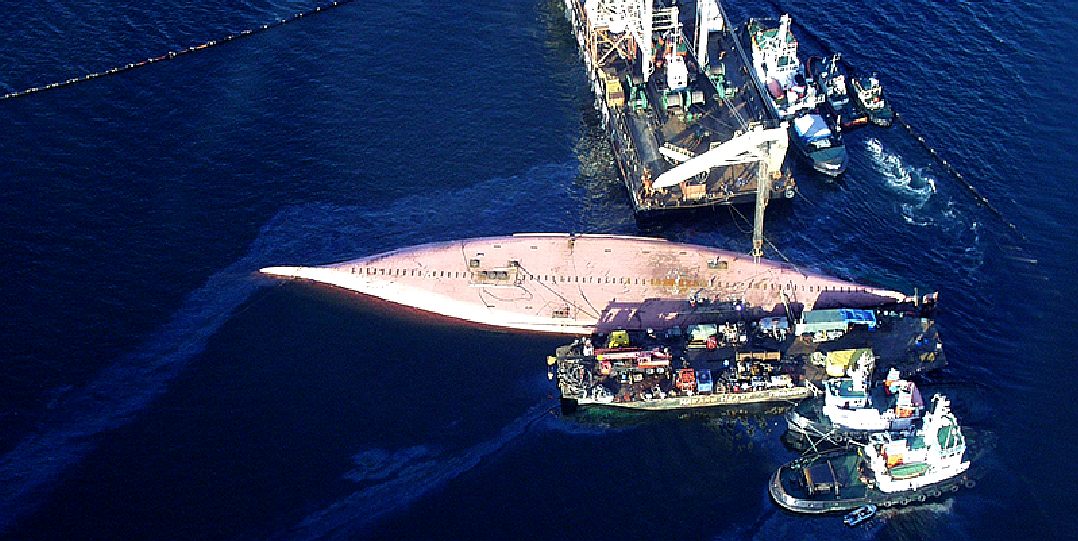
HELCOM -
The Baltic Marine Environment Protection Commission, usually referred to as HELCOM, is an intergovernmental organization of the nine Baltic Sea coastal countries and the European Union working to protect the marine environment of the Baltic Sea from all sources of pollution and to ensure safety of navigation in the region. Since 1974, HELCOM has been the governing body of the 'Convention on the Protection of the Marine Environment of the Baltic Sea Area', more commonly known as the Helsinki Convention.
Heli Haapasaari
Finnish Environment Institute (SYKE)
Chair of HELCOM Response Group
Tel: +358 40 1793050
E-mail: heli.haapasaari(at)environment.fi
Hermanni Backer
Professional Secretary for Maritime, Response and Maritime Spatial Planning
HELCOM
Tel: +358 46 8509199
E-mail: hermanni.backer(at)helcom.fi
MANDATE & PRINCIPLES
ECHO's mandate is to provide emergency assistance and relief (in the form of goods and services) to victims of conflict and natural or man-made disasters outside the EU. Its mandate also extends to disaster prevention and post-crisis operations.
European humanitarian aid is based on the principles of humanity and solidarity therefore its implementation depends on the application of international law, and in particular international humanitarian law, and on the fundamental principles of impartiality, non-discrimination and neutrality. ECHO’s humanitarian actions are based on compliance with international law and the humanitarian principles of humanity, neutrality, impartiality, and independence.Its implementation therefore depends on the application of international humanitarian law (IHL).
Humanity means that human suffering must be addressed wherever it is found, with particular attention to the most vulnerable; neutrality means that humanitarian aid must not favour any side in an armed conflict or other dispute; impartiality means that humanitarian aid must be provided solely on the basis of need, without discrimination; and independence means the autonomy of humanitarian objectives from political, economic, military or other objectives.
In 2007, at the initiative of Commissioner Louis Michel, the European Commission adopted a "European Consensus on Humanitarian Aid" to constitute the first European political text of reference on humanitarian aid. NGOs participated actively to the drafting of the European Consensus and it can be considered "the most comprehensive text and the nearest common position to NGOs". The European Consensus reaffirms the humanitarian principles of humanity, impartiality and independence. It also stipulates "humanitarian aid is not a management tool for crises management".
Although the European Consensus on Humanitarian Aid was welcomed as a positive strong signal, some NGOs expressed the wish that the success of the European Consensus on Humanitarian Aid should be enhanced humanitarian response at field level and not merely enhanced rhetoric in
Brussels. Amongst others, several NGOs called on the European Union to use its political influence to support humanitarian aid based on the mere principles of neutrality and impartiality and not on security agendas. In 2012 ECHO developed the first revision of the Consensus since its establishment, highlighting a need for stronger partnerships through quality selection of partners and ensuring enhanced accountability towards citizens and stakeholders.
The EU-funded, Partnership for Peace, aims to "strengthen the capacity for conflict resistance and empower marginalized parties as well to build trust between Israelis and Arabs by increasing regional cooperation." In response to this, the Palestinian Non-Governmental Organizations' Network, a body representing 135 NGOs in the West Bank and Gaza Strip, condemned the demand for collaboration between Palestinian NGOs and
Israeli NGOs, saying it was "an attempt to involve civil society organizations in nationally unacceptable normalization with the occupation and its institutions, giving the impression that normal relations exist between the occupation and the people living under occupation."
In 2012, ECHO and other donors worked with the Inter-Agency Standing Committee (IASC) to create the Transformative Agenda. Principles of humanitarian leadership, accountability and coordination were agreed upon to improve the rapidity, efficiency and effectiveness of humanitarian response. Additionally, civil protection was adopted as a part of ECHO's mandate to ensure better cooperation and protection during disaster among third and regional countries and international organisations.
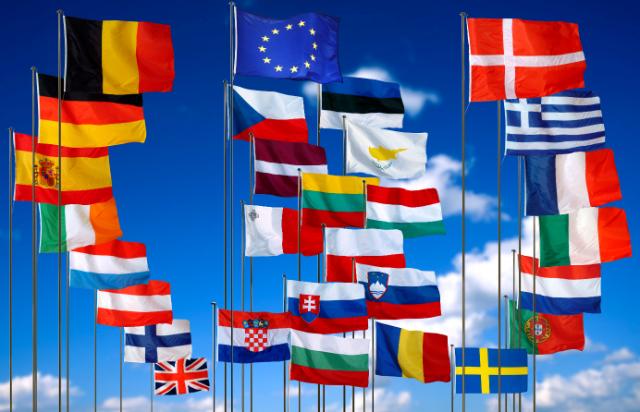
BECOME
A PARTNER
To
become a humanitarian partner of the European Commission,
organisations must apply for a Framework Partnership Agreement
(FPA).
Partners
are selected based on specific criteria and legal and
financial requirements, as well as quality standards. This
helps ensure that partnerships are of value to both the
European Commission and the applying organisation. The legal
and suitability criteria are set by the Regulation
on humanitarian aid (RHA), the new
Financial Regulation applicable to the general budget of the
European Communities (FR) and its Implementing Rules.
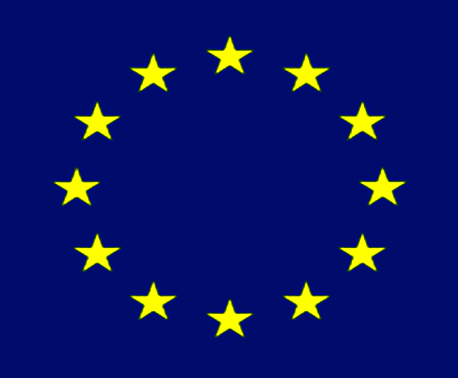
CONTACT
ECHO
European Commission
Directorate-General for humanitarian Aid and Civil Protection - DG ECHO
Unit responsiblefor Partner Support
B - 1049 Brussels
Belgium
LINKS
& REFERENCE
http://ec.europa.eu/echo/
http://www.helcom.fi/
http://ec.europa.eu/echo/news/boost-cooperation-maritime-emergencies_en
https://en.wikipedia.org/wiki/Directorate-General_for_European_Civil_Protection_and_Humanitarian_Aid_Operations

MAN
MADE DISASTER - Humans have been continuously dumping
plastic and other toxic waste in the seven seas for over 100
years. The plastic quotient now forms a major part of marine
pollution, to equal oil spills in the effect on ocean life.
The
Cleaner Oceans Foundation is a not for profit Non Governmental
Organization (NGO). Cleaner Oceans rely entirely on
donations from concerned citizens of Planet
Earth at time of publication in
January 2017.
This
website is copyright © Cleaner
Oceans Club Ltd (COCL) (Company No: 4674774)
January 2017
Solar
Studios, BN271RF, United Kingdom.
COCL
is a charity without share capital. The name Miss
Ocean™ is a
trade mark
of the Cleaner Oceans
Foundation™. The name SeaVax™,
is a trade
mark used under license. Site
Navigator
|







